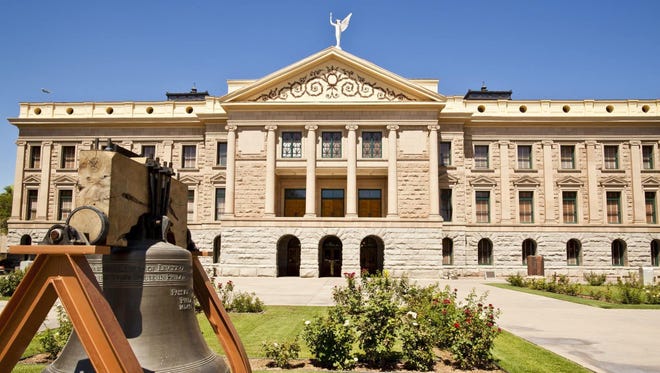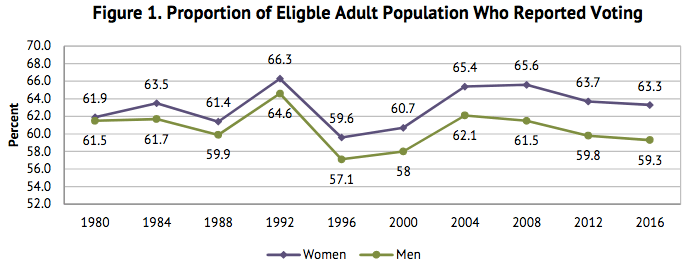
New here? That’s OK — we can help.
Maybe you just moved to Arizona and you’re trying to wrap your head around the state’s nuances. Or perhaps you’re newly engaged in following politics in Arizona.
The Grand Canyon State has all the normal political trappings, like Republicans, Democrats and people in between. The state, long controlled by the GOP, has started to shift in recent years as demographics change.
The 2020 election brings Arizona into the spotlight once again, as speculation ramps up over whether we will be a swing state, which offices could switch parties and what the future holds.
This glossary of terms is intended to help newcomers understand some of the context and quirks of politics in Arizona. Call it Arizona Politics, from (mostly) A to Z, with tongue partly in cheek.
Activist judges: Judges who rule in a manner that politicians in power don’t agree with. In Arizona, judges are selected on their merits and appointed, but subject to “retention elections,” where voters decide whether they should be allowed to keep their jobs.
Arizona Bill: The name of a personified drawing of the state of Arizona in cowboy boots, which walks you through the lengthy process of how a bill becomes a law here. Search “How an Arizona Bill Becomes a Law” online and you’ll find the guide on the Arizona Legislature’s website. It walks you through the entire process a bill must go through to become a law and includes a glossary of helpful terms.
Bipartisan: In the Arizona Legislature, bipartisan means at least one Democrat — and often just one — voted for something supported by the Republican majority.
Border state: Arizona shares an international border with Mexico, a relationship that ebbs and flows depending on who is in power in both places. Also, this is often how Arizona mayors, governors and members of Congress land interviews on national news shows on the regular.
BRBs: Pronounced “burbs,” these are “budget reconciliation bills”, technical pieces of legislation containing the state’s annual budget. They often are stuffed with significant changes in policy that few would agree to if they were to read the full bill.
California: Typically used as an insult, as in “Don’t California my Arizona.” Californians move to Arizona (and vice versa), but they better not bring their politics, regulations, tax rates, etc., with them, the thinking behind this goes. Arizonans will, however, enjoy the Golden State’s beaches all summer.
Career politicians: No one wants to become one, but many Arizona politicians eventually do. Often uttered by those running for office for the first time.
Chamber types: The business-minded politicians who typically attend Chamber of Commerce events. Gov. Doug Ducey, an ice cream man who became governor, is a classic example. The Arizona Chamber of Commerce and Industry is highly influential in Arizona politics.

Citizen initiatives: Also called ballot measures or direct democracy. Since statehood, Arizona’s Constitution has allowed its people to collect signatures and put measures directly before voters. This provides a way for the people to pass laws when the Legislature won’t (or, for some, a way for “special interests” to get their pet projects passed). The Legislature can also refer proposals to the ballot. The Republican-controlled Legislature has made it increasingly difficult for citizens’ initiatives to qualify. Past examples of voter initiatives approved by Arizonans include a minimum wage increase and the “right to try.” Several will be on this year’s ballot, including the legalization of recreational marijuana (which failed in 2016) and a tax increase to fund education.
Dark money: The actual definition is money from undisclosed donors seeking to influence an election. Yes, this is legal. Frequently misapplied to any money that comes from a source the speaker of this phrase disagrees with.
DINO: Democrat-in-name-only, a derogatory term used for moderates in the Democratic Party.
Election Day: Nov. 3 is Election Day this year. But the votes won’t all be counted that night, more than likely, which would leave some close races up in the air for several days after. Be prepared to wait a few days to know those outcomes.
Family values: This refers to conservative ideologies about what matters to families, often a shorthand reference to opposition to same-sex marriage and abortion. In Arizona, the Center for Arizona Policy, a powerful conservative group led by Cathi Herrod, typically advocates for “family values” policies like limiting access to abortion.
Floor speeches: When Arizona Democrats give lengthy remarks about what they would do, should they ever have power in the Legislature.
Freedom: A shorter way of saying “Don’t fence me in.” Invoking freedom seems to entitle a person to do almost whatever they want, from flouting mask mandates to carrying weapons into the Capitol.
Goldwater Republicans: Barry Goldwater unsuccessfully ran for president in 1964, but his politics have had an enduring impact on conservatives in Arizona. Republicans here have a libertarian mindset, eschewing big-government, much like Goldwater.
The Great State of Maricopa: A term often used derisively by people who live outside Maricopa County and believe the state revolves too much around its most populous county, where more than half of the state’s inhabitants live. It’s incredibly difficult to win a statewide race without winning Maricopa County.

Gubernatorial succession: In Arizona, if the governor resigns or is impeached, the secretary of state ascends to that office. It’s happened enough times in the modern era to be a legitimate possibility.
Independent: With a capital-I, Independent refers to the Independent Party. With a lowercase-i, it refers to a lack of political party. Voters who are independent (lowercase) play a critical role in Arizona, where people who aren’t registered with any political party comprise about one-third of voters. Independent has both literal and figurative meanings. Many politicians will declare themselves independents, but this is not to be taken literally. They are still members of parties and merely declaring that they won’t hew completely to party orthodoxy. In fact, despite Arizona’s preoccupation with independents, it has made it relatively difficult for Independents to run for office. But some campaigns court these voters. See: U.S. Sen. Kyrsten Sinema’s 2018 strategy.
Legislative immunity: The Arizona Constitution includes a privilege called legislative immunity. The provision says lawmakers can’t face civil processes during the legislative session or 15 days before its start. Some Arizona lawmakers have considered it as a get-out-of-jail-free card, especially when speeding at 120 mph on state highways. Police and courts often disagree.
Live within our means: Translation is “We will not raise taxes for this.”
Liberal: Depending on whom you’re asking, anything to the left of (and sometimes including) Gov. Doug Ducey. Often, Arizona liberals tend to be more moderate than those in bluer states.
McCain voter: The late U.S. Sen. John McCain attracted voters from both parties and those in the middle. Campaigns for statewide or competitive offices often try to appeal to moderates like McCain did for decades.

Mine Inspector: The least influential statewide public office, and the only such position in the nation decided by an election. Arizona doesn’t elect a lieutenant governor, but we have this. The job entails — you guessed it — inspecting mines.
Not against immigration: A phrase used by politicians to ward off claims of xenophobia. Used to clarify that they are not against legal immigration, but that their bill or stance is meant to punish those who have entered the country illegally.
Patriot: When used with a capital-P, it refers to far-right Republicans, including those behind the movement to reopen businesses during the pandemic. When used with a lowercase-p, it’s a compliment often wielded by Republicans, as in, “My colleague is a true patriot.”
PEVL: Pronounced sort of like “pebble,” or “pee-vul” in some instances, it’s the Permanent Early Voter List, Arizona’s method for receiving an early mail-in ballot. Both parties encourage its use, even when some national politicians bag on vote-by-mail. Most people in Maricopa County voted this way in August’s primary election. You can register online to join the list at servicearizona.com.
PPE: No, not personal protective equipment, at least not in this context. It’s the presidential preference election, where Arizonans select their preferred presidential candidates. It happened in March. The mention of this type of election may bring flashbacks to hourslong lines in 2016’s PPE.
Pilots: Arizonans seem to like people who can fly. The late U.S. Sen. John McCain was a Navy pilot. U.S. Sen. Martha McSally broke barriers as a female fighter pilot in the U.S. Air Force. Her opponent this year, Mark Kelly, was a naval aviator who then became an astronaut.
Purple: Frequent uses include, “Is Arizona purple?” The concept of a “purple” state means no party dominates. The state, once solidly red, has skewed more purple these days, with offices like U.S. senator and Maricopa County sheriff going blue in recent years. National media write some version of a story with the purple question every few weeks.
Picking winners and losers: As in, we don’t do that. Refers to free-market philosophies that believe government shouldn’t offer incentives to certain businesses over others, or regulate some businesses in different ways than others.
Red for Ed: Slogan used by teachers and education advocates during large protests at the Capitol in 2018 to advocate for teacher raises.

Reform: Often used with an issue as a modifier, such as criminal justice reform or campaign finance reform. Essentially, it means a change from the status quo. What constitutes a reform is in the eye of the beholder. Reforms often beget subsequent reforms.
RINO: Republican-in-name-only, a derogatory term used for moderates in the Republican Party.
Republican Briefs: A private newsletter published online by Frosty Taylor every weekday that details what’s going on with Arizona Republicans, including in-fighting, policy debates and event updates. Formerly called MCRC Briefs.
Sleeping giant: A block of Latino voters that politicians either fear or hope to engage, depending on party affiliation. For years, Latino activists have warned that when this group awakens, it will change Arizona’s political landscape. Although groups have created initiatives to energize the Latino vote in the 2016 and 2018 cycles, experts are still split on whether the giant has stirred.
Special interests: People or entities on the opposing side.
Suburban voters: These voters hold a lot of sway in Arizona elections, and campaigns often try to court them, particularly suburban women in places like Chandler and Ahwatukee, and especially in close races.
Transplants: Arizona is growing fast, with people moving here from around the country. If you’re new here, don’t fret — you’re not alone. The constant influx means Arizona is ever-changing. Even incumbents have to introduce themselves anew to many of their potential voters each cycle.
Vote: You should do it. Register at arizona.vote. The deadline to register to vote in the general election is Oct. 5. Even if you believe you’re registered, it’s always smart to double-check. You can vote by mail or in person. You can receive alerts or check online to ensure your ballot is received and counted.
Voter Protection Act: This was a citizen initiative (see above) which declared that once voters pass an initiative, the Legislature can’t reverse it. This came about after voters approved a medical marijuana initiative that the Legislature refused to enact. The rule makes it exceedingly difficult for lawmakers to correct any flaws, whether real or perceived, in voter-approved programs. Policy wonks fear dense initiatives with unintended consequences that can’t be fixed. Some Republican lawmakers have toyed with asking the voters if they would willingly give up this power.
Washington: Bad. But also, the place everyone wants to get to. Similar to Congress, which is also bad, until you run for it.
“When will my opponent denounce … ?”: Translated as, “When will my opponent talk about the thing I want them to talk about instead of the thing they want to talk about?”
White hat and cowboy boots: The uniform of a city politician courting rural voters. Even more obvious if the boots and hat are squeaky clean.
Reach reporter Rachel Leingang by email at rachel.leingang@gannett.com or by phone at 602-444-8157, or find her on Twitter and Facebook.
Support local journalism. Subscribe to azcentral.com today.


